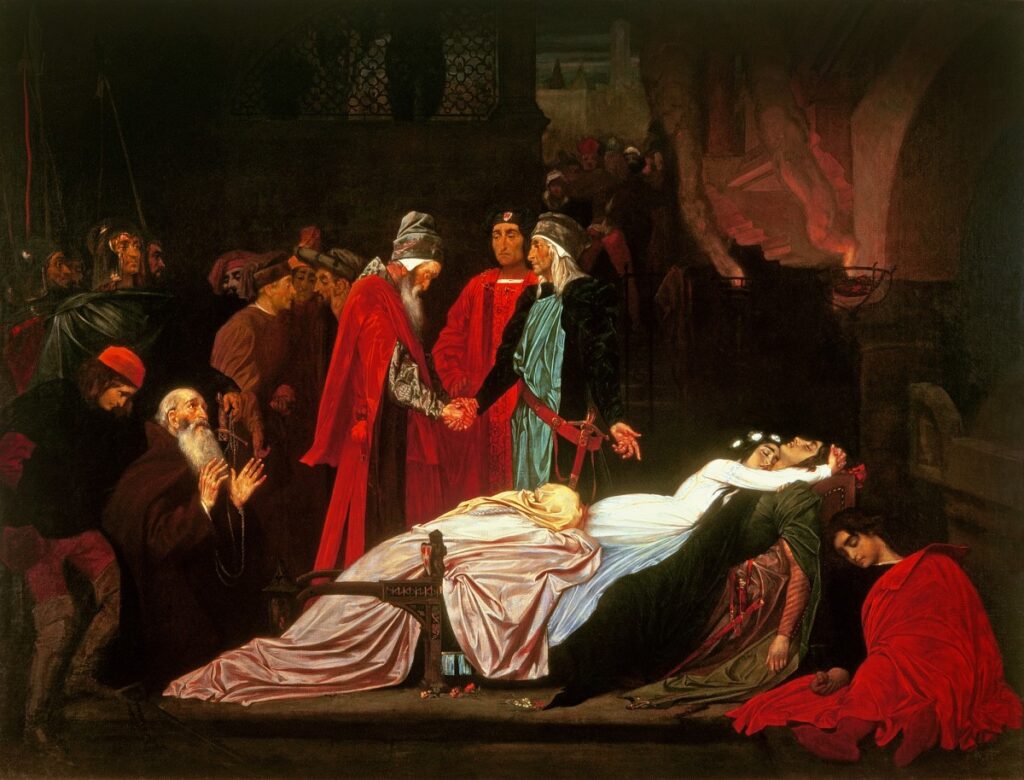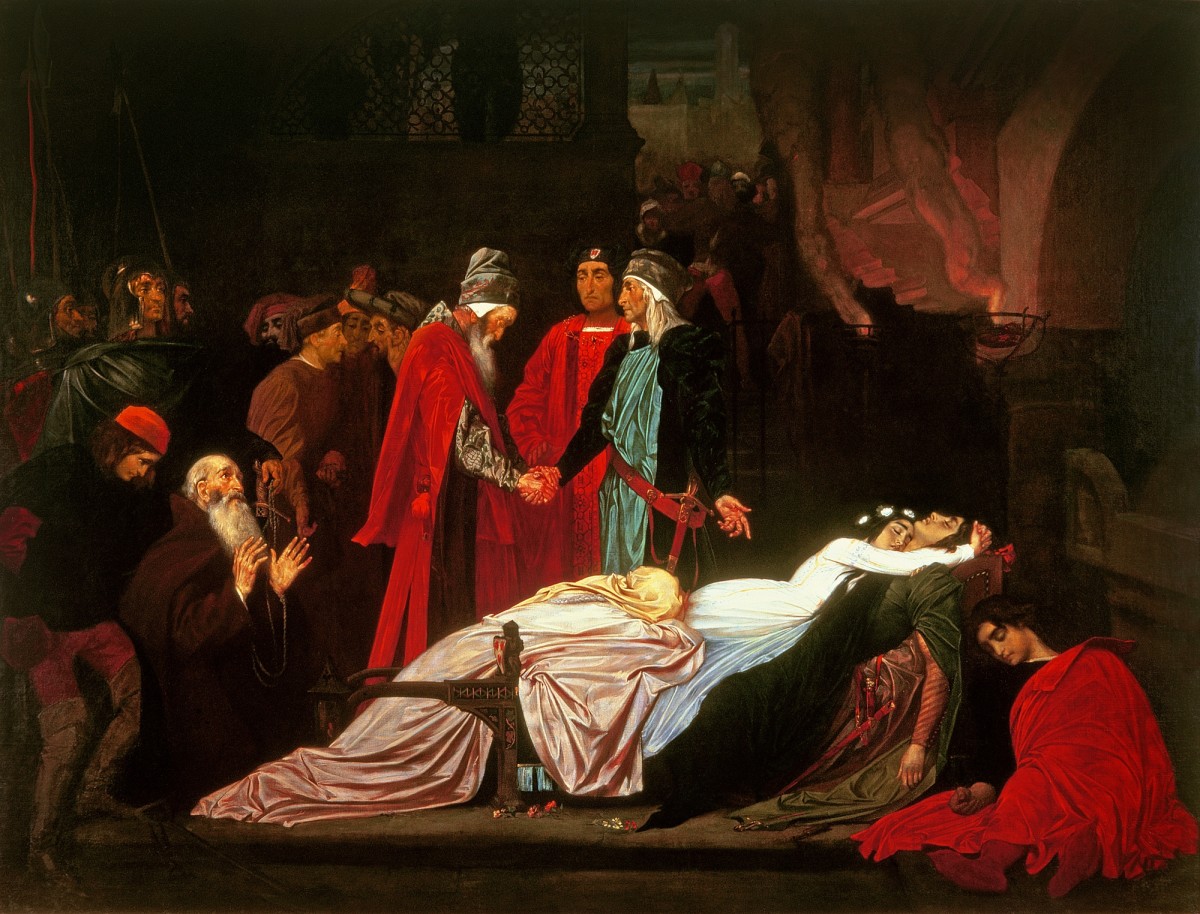
The Tragic Echoes: Examining the ‘Death of Romeo and Juliet’ Quotes and Their Enduring Power
William Shakespeare’s *Romeo and Juliet* is a cornerstone of Western literature, a timeless tale of star-crossed lovers whose fate is sealed by the feuding families of Montague and Capulet. The play’s enduring power lies not only in its exploration of love, hate, and societal pressures but also in its masterful use of language. The ‘Death of Romeo and Juliet’ quotes are particularly poignant, encapsulating the play’s central themes of loss, regret, and the destructive nature of unchecked animosity. This article delves into the most memorable of these quotes, analyzing their context, impact, and the lasting legacy they have created.
The play’s tragic climax, the *death of Romeo and Juliet*, is a carefully constructed sequence of events. Misunderstandings, impulsive actions, and the relentless grip of fate converge to create an environment where love is ultimately extinguished. The quotes surrounding the *death of Romeo and Juliet* are not simply dramatic pronouncements; they are windows into the characters’ final moments, revealing their deepest emotions and the devastating consequences of their choices. The play’s exploration of the *death of Romeo and Juliet* is a profound commentary on the human condition.
A Descent into Darkness: Romeo’s Final Words
Romeo, driven by grief and a desperate desire to be reunited with Juliet, makes a fateful decision to return to Verona. Unaware of Juliet’s staged death, he believes she is truly gone. His final moments are marked by a sense of inevitability and a profound despair. One of the most powerful quotes from the *death of Romeo and Juliet* sequence is his final words before drinking the poison: “O, here will I set up my everlasting rest, / And shake the yoke of inauspicious stars / From this world-wearied flesh.” This quote underscores the role of fate in the tragedy. Romeo believes his destiny is predetermined, dictated by the stars, and he welcomes death as an escape from his suffering. The *death of Romeo and Juliet* is, in his eyes, a release.
Another crucial quote from Romeo, just before his demise, is, “Thus with a kiss I die.” This encapsulates the essence of Romeo’s love for Juliet. Even in death, his thoughts are consumed by her. The kiss is not just a gesture of affection but a final act of devotion, a testament to the enduring power of their love. This quote provides a powerful insight into the events surrounding the *death of Romeo and Juliet*.
Juliet’s Last Breath: A Testament to Love and Loss
Juliet’s discovery of Romeo’s lifeless body is one of the most heart-wrenching scenes in the play. Her reaction is immediate and desperate. Juliet’s words, as she recognizes Romeo’s death, are filled with sorrow and a determination to join him. A memorable quote, “O happy dagger, / This is thy sheath; there rust, and let me die,” highlights her resolve to end her own life. The dagger, a symbol of violence and death, becomes a tool of liberation, a means to escape the pain of living without Romeo. The *death of Romeo and Juliet* is complete.
Juliet’s final words, before she stabs herself, are a declaration of her unwavering love. The act of suicide is not just an impulsive decision; it’s the ultimate act of loyalty to her beloved. The *death of Romeo and Juliet* is not merely a consequence of external forces; it’s a testament to the depth and power of their love, even in the face of adversity. The *death of Romeo and Juliet* is a culmination of the play’s central themes.
The Friar’s Role: A Catalyst for Tragedy
Friar Laurence, the well-intentioned but ultimately flawed Franciscan friar, plays a significant role in the tragedy. His plan to reunite Romeo and Juliet, though seemingly benevolent, is riddled with missteps and poor communication. While not directly responsible for the *death of Romeo and Juliet*, his actions contribute significantly to the play’s tragic outcome. Quotes attributed to the Friar, such as his lament upon discovering the lovers’ bodies, reveal his remorse and understanding of the consequences of his actions. The *death of Romeo and Juliet* stands as a warning.
Friar Laurence’s attempts to mediate the conflict between the families and to assist the lovers ultimately fail, underscoring the limitations of human intervention in the face of overwhelming circumstances. The *death of Romeo and Juliet* serves as a potent reminder of the complexities of fate and the unintended consequences of even the most well-meaning actions. The *death of Romeo and Juliet* provides a sobering lesson.
The Prince’s Declaration: Justice and Reconciliation
At the play’s conclusion, Prince Escalus, the ruler of Verona, delivers a powerful speech that summarizes the tragedy and assigns responsibility. His words are a sobering reflection on the consequences of hatred and the need for reconciliation. The Prince’s pronouncements following the *death of Romeo and Juliet* are crucial. He lays blame on both the Capulets and the Montagues, acknowledging the role of their feud in the lovers’ demise. His quote, “See what a scourge is laid upon your hate, / That heaven finds means to kill your joys with love!” highlights the devastating impact of the families’ long-standing animosity.
The Prince’s final words offer a glimmer of hope for the future, suggesting that the *death of Romeo and Juliet*, though tragic, might serve as a catalyst for peace. This quote is a significant part of the context surrounding the *death of Romeo and Juliet*.
Legacy and Impact: The Enduring Power of the Quotes
The quotes surrounding the *death of Romeo and Juliet* have had a profound and lasting impact on literature, art, and popular culture. They are frequently referenced, parodied, and adapted in various forms, from film and theater to music and literature. The play’s themes of love, loss, and the destructive nature of hatred continue to resonate with audiences centuries after its creation. The *death of Romeo and Juliet* quotes are among the most famous in the English language.
The language of Shakespeare, particularly in these final scenes, is both beautiful and emotionally charged. The quotes are rich in imagery, metaphor, and dramatic irony, making them incredibly memorable and impactful. The *death of Romeo and Juliet* quotes continue to inspire artists and writers today.
The enduring power of these quotes lies in their ability to connect with universal human experiences. They capture the raw emotions of love, loss, and grief in a way that transcends time and cultural boundaries. The *death of Romeo and Juliet* quotes are a testament to Shakespeare’s genius. The *death of Romeo and Juliet* is a story that will never be forgotten. The *death of Romeo and Juliet* is a story of love.
Analyzing the Quotes: A Deeper Dive
Let’s analyze some of the most impactful quotes related to the *death of Romeo and Juliet* in more detail. We’ll explore the specific language used, the emotional impact, and the significance within the broader context of the play.
- “O, here will I set up my everlasting rest, / And shake the yoke of inauspicious stars / From this world-wearied flesh.” This quote reveals Romeo’s fatalism and his belief that he is a victim of fate. The “inauspicious stars” represent the forces beyond his control, and his desire to “shake the yoke” suggests a yearning for freedom from suffering.
- “Thus with a kiss I die.” This powerful statement underscores Romeo’s unwavering love for Juliet. The kiss is the ultimate expression of his devotion, even in death.
- “O happy dagger, / This is thy sheath; there rust, and let me die.” Juliet’s words express her resolve to end her own life and be with Romeo. The “dagger” is personified as a friend, offering a means of escape from her grief.
- “See what a scourge is laid upon your hate, / That heaven finds means to kill your joys with love!” Prince Escalus’s words highlight the devastating consequences of the feud between the Montagues and the Capulets. He acknowledges that their hatred has resulted in the ultimate tragedy.
These quotes, and many others, contribute to the profound emotional impact of the play and continue to resonate with audiences today. The *death of Romeo and Juliet* is a seminal work of literature.
Conclusion: The Enduring Legacy
The *death of Romeo and Juliet* quotes are not merely lines of dialogue; they are powerful expressions of love, loss, and the enduring human capacity for both great passion and profound suffering. Shakespeare’s masterful use of language allows these quotes to transcend the boundaries of time and culture, continuing to move and inspire audiences centuries after the play’s creation. The play’s exploration of the *death of Romeo and Juliet* is a testament to the power of love and the destructive nature of hatred. The *death of Romeo and Juliet* remains a potent reminder of the fragility of life and the enduring power of the human spirit. The *death of Romeo and Juliet* is a powerful story.
[See also: Thematic Analysis of Romeo and Juliet, The Symbolism of Light and Dark in Romeo and Juliet, Exploring the Role of Fate in Shakespearean Tragedy, A Comparison of Romeo and Juliet Adaptations]


